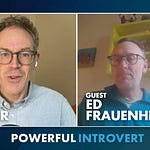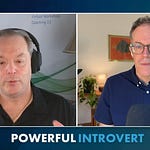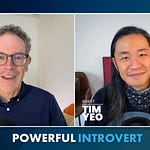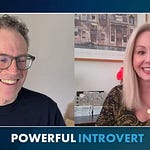We’re here to talk about being an introvert, our incredible strengths and the challenges we face in business. We’ll explore how society’s values and hidden assumptions favor extroverted leaders, and how that hurts us all. You’ll hear interviews with business leaders, experts in the field, and with people like you and me - just trying to make sense of this and improve our lives. Plus you’ll get practical advice for your career and personal wellbeing.
So let’s dive in
I’m an introvert and I’m a tech executive with 20+ years working in software startups. It’s taken me a lot of work and personal growth to make my way as a leader, and to be clear - I don’t have all the answers.
Working in tech, as you may guess, I know a few introverts. I’ve mentored quite a few, but it wasn’t until I started researching this topic that I realized how widespread introversion really was. Academic studies estimate up to 50% of the population qualify as introverts - though clearly there’s a spectrum.
Even if you say 30% that’s a huge population that struggles with core aspects of their personality - things that in reality are their strengths. Introverts think, feel, and process information deeply - and yes, internally. They can be excellent listeners, collaborators, and strategic thinkers, and yes, public speakers. You’ll count Warren Buffett, Bill Gates, Mahatma Ghandi, Rosa Parks, Barack Obama, Marissa Mayer, and Abraham Lincoln among your Pantheon of introverted leaders.
Introverts have massive untapped potential to offer in business, and that’s a world-changing opportunity. That’s more happiness, more productivity and economic gain - if we can just make more room for the quiet voices in the room.
So what’s stopping us?
The business world is still very confused about introverts.
From our executive teams, to our boardrooms and business schools, we glorify the loud, outspoken, attention grabbing leader. Extroversion is still very much the ticket to get ahead in most places.
There must be some reasons for this. Maybe it’s that extroverts are actually smarter, or have some lock on the best ideas. Is that true in your experience? Psychology studies show most of us do think that’s true. They call this our extrovert bias. Does that mean maybe introverts are smarter? No. The best ideas are evenly distributed across the population regardless of how outspoken you are.
This bias toward extroverted leaders means we’re stifling up to half of our best ideas. What is the wasted economic potential of losing half of your best ideas? Could you even measure it in trillions of dollars? And this is just setting aside the cost in human happiness.
This is just one of the reasons I’m so fired up about this.
Here’s my personal story, and why I’m doing this now
I’m an introverted leader, and frankly, until recently, I wasn’t fully able to admit that to myself. It seemed like a contradiction in terms. In truth, I’d been fighting this part of myself for decades.
I had internalized this cultural bias from an early age, through family experiences you may have had, being shamed for being quiet, or needing some space (“speak up”, “stand up straight”, “I can’t hear you”, or “stop being be so shy”), and these cues persisted in schools. By the time I reached the workforce, and advanced in my career, and became drawn to leadership, I saw my introversion as a deep flaw, something to eradicate, which - at my age, seemed increasingly unlikely.
I was a walking mass of contradictions. In many ways I’m a typical introvert - I love writing, contemplation, meditation, working alone on a problem. But what I’ve come to value even more is collaborating with a team, leading teams, mentorship. I even enjoy public speaking. On the flip side, I hate networking, and I have a fairly short social battery with strangers. What the hell was wrong with me?
That’s when I came across Susan Cain’s work, her book Quiet and her famous TED talk. She was the first one to shine a light for me on the quiet power introverts have. And yes, introverts can be leaders. And I finally realized that what was flawed was our toxic one-size-fits all idea of leadership.
Once I saw this, I couldn’t unsee it. I stopped being ashamed of these core aspects of my personality. Not only are there others like me, up to half of us are being stifled by cultural biases. It’s serving us worse and worse in this 21st century. The change is coming too fast. We’ll need all of us contributing if we hope to survive challenges like the climate crisis, and technological change.
Some are calling the growing awareness about the topic the Quiet Revolution - but in my opinion, it’s not spreading fast enough. Cain published Quiet in 2013. This information has been around for over 10 years, but it wasn’t reaching me. So I hope to accelerate this coming shift in business culture by supporting the next generation of quiet aspiring leaders - that’s you - to step into their power. It’s what I wish my 30-year-old self could have heard. And my sons (the introverted one, in particular).
Here’s what you can expect from Powerful Introvert.
When you sign up for my newsletter, you’ll get weekly updates with new ideas, practical tips, and research, as well as everything going on with Powerful Introvert.
This includes:
Interviews with
Leading voices on introversion - writers, speakers, psychologists and academics at the forefront of the field
Leadership experts with practical career advice for aspiring leaders
Business leaders and industry veterans consciously creating more inclusive work environments
Finally folks like you and me, sharing their experiences. We’re all learning about this together.
Foundational topics like
The history behind the Extrovert Myth
The Strengths of Introverted Leaders
Redefining Leadership
Overcoming Self-Doubt
More Real-World Examples of Quiet Leaders
Practical skills favoring introverts
Leading with empathy
Handling conflict
Strategic thinking
Networking
Public Speaking
Overcoming challenges
Silencing the inner critic - building self-confidence
Navigating extroverted spaces
Speaking up and finding your voice
Managing burnout & protecting your energy
Building trust as a leader
Expanding the conversation - challenging business as a whole
Inclusive leadership - making spaces for quiet voices
Redefining leadership structures
Remaking the workplace
Norms for remote work
I hope this sounds intriguing.
Again sign up for my newsletter, and I’ll keep you posted. Thanks for listening.











